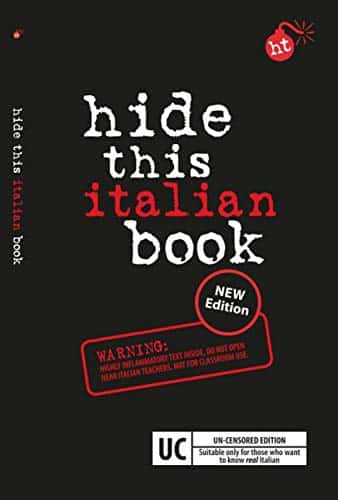
Italian Listening: 10 Tips and 33 Tools
Step into the real Italian world and a barrage of verbs, prepositions and adjectives come flying toward you rapid-fire.
You try to catch them, but they’re gone before you know it.
Never fear! With a little work and focus, your ears will be trained to take in the sweet sounds of the sunny peninsula in no time.
Just follow these 10 tips to improve Italian listening skills—complete with lots of resources!
Contents
- Improve Your Italian Listening Skills Over Your Daily Espresso
- 1. Watch Italian television
- 2. Enjoy Italian movies
- 3. Learn from Italian YouTube videos
- 4. Make use of language learning programs
- 5. Study with Italian music
- 6. Dive into Italian podcasts
- 7. Listen to audiobooks in Italian
- 8. Have conversations with native Italian speakers
- 9. Listen actively and consistently to the right content
- 10. Remember to study often
- Why Improve Italian Listening Skills
- Additional Italian Listening Resources
Download: This blog post is available as a convenient and portable PDF that you can take anywhere. Click here to get a copy. (Download)
Improve Your Italian Listening Skills Over Your Daily Espresso
1. Watch Italian television
Nowadays, there are more ways than ever to experience the world of Italian TV.
If you’re not taking advantage of it, you’re not only missing out on a great learning resource but also some of the most exhilarating, heart-wrenching and gut-busting entertainment out there.
As an Italian student, there are a variety of reasons that TV shows are important to your learning:
- Culture: Italians love their entertainment! Besides being one with the populace, Italian television provides a great window into cultural values, the topics that natives find entertaining, colloquialisms and more.
- Dialects and accents: Shows set in specific regions offer a taste of the large range of Italian accents and dialects. For instance, the TV program “Romanzo Criminale” uses the authentic Roman dialect and accent. Exposure to various types of Italian will improve your overall comprehension of the language.
- Authentic Italian usage: Textbooks and their audio components are great learning companions, but they are tailored to students. Real Italian television shows help you understand the pace, vocabulary and grammar that Italians actually use when speaking to one another.
2. Enjoy Italian movies
What could be more fun than learning with Italian cinema?
Of course, you can pick a movie and watch the whole thing in one go, or break it into manageable pieces as necessary (and yeah, it’s necessary for most language learners—don’t be ashamed!).
But you can also approach a movie as an audio story. Maybe you’re in bed about to sleep. Don your earphones for a few minutes and play the movie without looking at your screen.
When you subtract the visual component of a film, the audio takes center stage and becomes a lot more meaningful and crisp. Your mind hones in on the sounds. Suddenly, the nuances and inflections of speech come alive.
![La Coppia Dei Campioni [Import italien]](https://www.fluentu.com/blog/wp-content/uploads/2024/07/51lECl1K0bL._SL500_.jpg)
You can also find a movie from this list or browse Fandor, a movie-streaming website with a fantastic selection of Italian films.
3. Learn from Italian YouTube videos
YouTube is a virtually endless resource for content that can help you improve your Italian listening skills.
You can start with Italian language teachers, such as:
- Learn Italian with Lucrezia: She has hundreds of videos on a wide array of topics for all levels. She speaks at a good speed, but there are no English subtitles available.
- Italiano Automatico: The earliest videos are in slow Italian and most videos are only two to five minutes, cover a variety of topics and come with both Italian and English subtitles.
- Plenty of others from this post and this post!
Another great source for listening practice on YouTube is Italian vloggers and general content creators. These authentic videos are made by and for native Italians—perfect for hearing the language as it’s really spoken.
You’ll get cultural insights, linguistic nuances and fun host personalities, making these videos more compelling than your typical Italian listening practice resource. The video aspect also provides context to aid with comprehension.
There are Italian YouTubers who cover all sorts of topics. To start, check out:
- Silvia & Kids: A great option for beginner Italian students as the language is generally simple and plain speech, with emphasis on tonality and common activities.
- Sofie’s World: She moved from the US to Rome in order to trace her roots. She vlogs mostly in English but has a playlist of videos where she speaks Italian—great for inspiration!
- iPantellas: Jacopo and Daniel are popular YouTubers who create humorous parodies. A hit with Italian youth, this channel will benefit anyone looking to keep up with Italian pop culture.
- Willwoosh: Willwoosh gained popularity with his one-man skits and parodies. His channel gives a hilarious peek into modern Italian humor and culture.
- Chef Stefano Barbato: For all those Italian learners who love to cook! You’ll practice Italian listening while learning new recipes—it doesn’t get more authentic than following recipes from a native Italian.
- More Italian YouTubers in this post!
You can also find Italian speeches on YouTube. These have their own cadence and rhythm that are quite distinct from other Italian content.
Speeches are usually fairly formal. You’ll find a healthy supply of words and phrases that don’t bubble up in everyday conversations but are still vital for language mastery.
So, if you’re an intermediate or advanced language learner, try listening to some Italian speeches. Some (mostly political) examples include:
- Alessandro di Battista: He’s a former member of the 5 Star Movement, a party known for its innovative political agenda as well as its green initiatives.
- Matteo Salvini: A prominent Italian politician who aligns with the far-right, Salvini currently serves as Deputy Prime Minister of Italy and Minister of Infrastructure and Transport.
- Sergio Mattarella: The current president of Italy, Mattarella is one of only two Italian presidents to serve more than one term.
- Roberto Benigni: He’s an actor, director, screenwriter and comedian, and he gives fantastic speeches.
4. Make use of language learning programs
Now, unless you’re an advanced, almost-fluent Italian student, there’s a high chance that long videos in Italian may be too far beyond your level to be enjoyable or even helpful.
This is where immersive language learning programs can help you out.
FluentU, for example, takes authentic Italian videos—like movie trailers, music videos, news and inspiring talks—and turns them into bite-sized language learning lessons.
The bilingual subtitles will help ensure you understand what you hear. Hovering over a word will show a quick definition and clicking on it will provide a full contextual breakdown and additional video usages.
FluentU also comes with personalized quizzes and flashcards. Videos are organized by difficulty, so there’s something for every level of learner to practice with.
This language learning program can be used on the web or as an app on iOS and Android devices.
Other language learning resources can also be immensely helpful in improving your Italian listening skills.
Loescher Editore offers a resource called Italiano per Stranieri (Italian for Foreigners) that can be used to learn Italian vocabulary and grammar as well as practice for reading, writing and listening.
The website offers a dozen listening comprehension exercises from real Italian media and popular culture. Each listening lesson includes an audio file or video as well as a PDF with comprehension questions (and answers).
The listening comprehension tests are sorted by levels A1 (beginner) to C1 (advanced). Click the livello (level) dropdown menu and choose the one that’s right for you.
You can find additional immersive Italian software here. If you’re feeling truly adventurous, check out language programs located in the country of Italy itself.
5. Study with Italian music
Music helps us remember things more easily—think of how many songs from childhood that you still know all the words to!
Italian is loved around the world for its musical lilts and hooks, so use that lovely Italian music to enhance your studying!
Italian songs are great for high-retention, high-yield audio practice. Here are some sources to get you started:
- Coccole Sonore (Sound Cuddles): This charming collection of children’s songs is perfect for beginners and includes topics like numbers, parts of the body, family members and more.
- Radio Italia’s YouTube channel: As played on the popular Italian music radio station of the same name, these hits will have you jamming to the same songs as native Italian speakers.
6. Dive into Italian podcasts
Of course, you can always simply listen to videos without watching them to really test your skills. But with podcasts, you often won’t have a video to watch anyway.
So when you get confident and are ready to take things to the next level, find an Italian podcast that fits your interests and start listening!
You won’t be able to see the speakers’ mouths moving or any contextual body language or scenes, so prepare for some difficulty. It’s a good idea to keep a notebook handy so you can jot down new words and expressions as you listen to your chosen shows.
You may not understand much in the beginning, but try to stick with it and listen continuously without pausing too many times. When you finish, look up the words and phrases you’ve written and study them.
As podcasts go, any topic can be covered, though there’s always mainstays that cover politics, news, social issues and business.
Here are a few Italian podcasts to get you started:
- News in Slow Italian: Keep up with current events at a manageable speed. This does require a paid subscription, but the speech is clear and slow, and interactive transcripts are available. This show is great for beginners.
- Caterpillar: An Italian version of “morning zoo” radio programming where the hosts talk about everything from culture and history to current happenings in science, technology and more. This show is ideal for advanced learners as it’s quick and nuanced.
- Decanter: This popular show covers Italian dishes, from the classics to fusion. Advanced language listeners will learn about Italian food and language use—imagine how good the hosts have to be to describe food with just a microphone.
7. Listen to audiobooks in Italian
While audiobooks are usually the province of advanced language learners, you don’t have to write them off if you’re not quite there yet!
There are audiobooks targeted at children as well as young adult stories and plenty of intermediate level tales you can find in this audio-only format to challenge your Italian listening skills.
You can find audiobooks for Italian listening practice through sites like Il Narratore, Audible and LibriVox, just to name a few.
You can even find audiobooks in Italian on YouTube. For instance, this playlist contains Dante’s “The Divine Comedy” in Italian audio with English subtitles. This video is the first part of “Il Barone Rampante” (The Baron in the Trees)—a story of a boy who climbs to the top of a tree to live there in his own kingdom.
Audiobooks are almost always several hours long, so don’t be afraid to take them in parts. No need to overwhelm yourself, after all.
8. Have conversations with native Italian speakers
This is a great way to improve Italian listening skills as well as overall fluency.
Chatting with someone in Italian forces you to pay close attention to what is being said, as you need to formulate proper responses to keep the conversational ball rolling.
You can look for Italian groups on Meetup. It’s possible there are existing groups in your area for Italian learners, lovers of Italian culture or something else Italian-related.
Even if you can’t find conversational Italian groups, you may be able to join other meetups that lead to such connections. And you could just as easily start your own group!
 There’s also MyLanguageExchange.com. This site is useful for online-only conversation practice as it allows you to meet people from all over the world who are interested in practicing other languages.
There’s also MyLanguageExchange.com. This site is useful for online-only conversation practice as it allows you to meet people from all over the world who are interested in practicing other languages.
You can exchange emails and texts as well as voice calls and video chats.
If your Italian skills aren’t quite up to par, that’s okay! People in language exchanges are incredibly patient—they know you’re practicing. Plus, there are always Italian translator apps to help in case you get stuck.
9. Listen actively and consistently to the right content
Wait—aren’t all of the previous points “the right content”?!
Well, yes. But you’ve got to make sure your Italian listening content matches your language level. The most excellent content ever created won’t help you if it’s much too easy or much too hard.
Further, you have to practice active listening. Just how you pay close attention to your Italian language exchange partner when they speak, you need to do that with every Italian listening practice resource you use.
When you listen, you should be honing in on the words’ pronunciation and focusing on the flow of words and phrases. It also helps to write things down to review later, though you may want to pause your audio while you do this.
You also can and should speak during your Italian listening practice! This will help your tonality, pronunciation and inflections—plus, you’ve got to listen in order to repeat what you heard.
And lastly, you’ve got to be consistent with your listening practice. Tuning into a podcast every other Wednesday won’t cut it. Just like athletes, musicians and performers, you need a schedule.
Turn this into a daily routine. Make your listening time an integral part of your studying. Don’t feel like listening today? Too bad. If you really want to improve, you have to put the time in consistently.
10. Remember to study often
Working to improve your Italian listening skills means you’ll hear a lot of grammar patterns and new vocabulary.
To study your new grammar, you might do some sentence mining exercises or shadowing practice. For vocabulary, study the words however you like best—flashcards, mind maps, games, etc.
Unless you’re selecting your listening materials solely by region, you’re going to hear a variety of Italian dialects and accents. And while there may be hundreds of ways to speak Italian across the country, there is a correct way to pronounce each word.

Search your word, try saying it out loud, then click the “ascoltare” (listen) button and see how close you got. Does it sound the same in your listening practice materials?
To really get to know a language, you also have to study what they don’t teach you in textbooks, and I’m not talking about all the flamboyant hand gestures!
Slang—both spoken and typed—is a big part of the Italian language. That means the Italian in your textbook course and the Italian you hear on the street could be very different.
Italians are also quite liberal with their use of bad words, and you hear them often on TV and in everyday life, though the only really offensive ones are the dreaded bestemmie (blasphemies).
You could buy a book like “Hide This Italian Book” and start drilling slang to pick up where your studies leave off!
Why Improve Italian Listening Skills
Listening to a foreign language can be really hard work! Here’s why improving your Italian listening skills is a good idea:
- You’ll learn more vocabulary and grammar and have ample opportunities to recognize what you already know.
- It helps you get more comfortable with the variety of Italian, including accents, dialects and colloquialisms.
- It improves your conversation abilities—the more you understand when others speak, the better you can respond.
- You’ll enjoy using the language more. Beyond the ability to speak to more people, you’ll also be able to consume more native Italian content.
- It boosts your pronunciation skills. Hearing words repeatedly will help drill them into your head the right way.
- It even improves the speed of your Italian! Listening doesn’t come with the built-in lag time (or translation time) that reading does.
Additional Italian Listening Resources
The Council of Europe offers free resources to help with the Common European Framework of Reference for Languages (CEFR).
On their website, they link to official tests with listening comprehension exercises in Italian. These materials are particularly useful for those who want to practice for a language certification exam.

Each file includes a short video in Italian and some true or false questions. Note that the answers to these questions are only available for some activities and can be found in the comment sections.
In addition to simple lessons in vocabulary and grammar, this website also offers nine listening comprehension tests for Italian learners. The above link takes you directly there.
Their audio-based activities include three levels: facile (easy), intermedio (intermediate) and avanzato (advanced), which correspond to the A, B and C levels of the CEFR.
Each lesson includes a short audio file in Italian as well as some true or false questions which can be submitted for automatic grading.
Armed with these tips, you’ll surely forge ahead, breaking through the Italian language barrier before you know it!
When you arrive on the other side, you’ll find that what was once a stressful challenge has become nothing short of music to your ears.
Download: This blog post is available as a convenient and portable PDF that you can take anywhere. Click here to get a copy. (Download)








